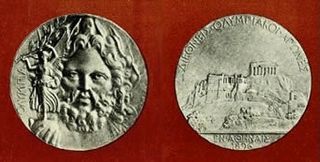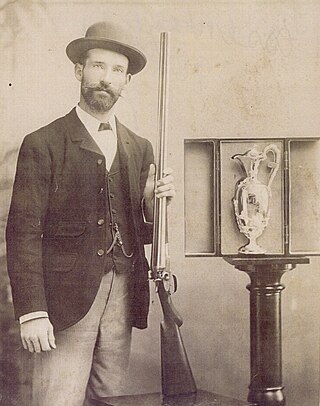Related Research Articles

The Summer Olympic Games, also known as the Summer Olympics or the Games of the Olympiad, is a major international multi-sport event normally held once every four years. The inaugural Games took place in 1896 in Athens, Greece, and the most recent was held in 2024 in Paris, France. This was the first international multi-sport event of its kind, organized by the International Olympic Committee (IOC) founded by Pierre de Coubertin. The tradition of awarding medals began in 1904; in each Olympic event, gold medals are awarded for first place, silver medals for second place, and bronze medals for third place. The Winter Olympic Games were created out of the success of the Summer Olympic Games, which are regarded as the largest and most prestigious multi-sport international event in the world.

The 1900 Summer Olympics, today officially known as the Games of the II Olympiad and also known as Paris 1900, were an international multi-sport event that took place in Paris, France, from 14 May to 28 October 1900. No opening or closing ceremonies were held.

At the 1900 Summer Olympics in Paris, many shooting events were featured within the concurrent 1900 Exposition Universelle, but only eight events currently are considered as "Olympic" by IOC. Before July 2021 the International Olympic Committee has never decided which events were "Olympic" and which were not. The competitions were held from 3 August to 5 August and took place at the military sporting complex in Satory and at Boulogne-Billancourt. According to Olympic historian Bill Mallon, one of these nine shooting events was an event for professionals with prize money and therefore does not meet inclusion criteria for 1900 Olympic Games events.

An Olympic medal is awarded to successful competitors at one of the Olympic Games. There are three classes of medal to be won: gold, silver, and bronze, awarded to first, second, and third place, respectively. The granting of awards is laid out in detail in the Olympic protocols.

Olympic sports are sports that are contested in the Summer Olympic Games and Winter Olympic Games. The 2024 Summer Olympics included 32 sports; the 2022 Winter Olympics included seven sports. Each Olympic sport is represented at the International Olympic Committee (IOC) by an international governing body called an International Federation (IF).
The 1900 Summer Olympics were held in Paris, France, from May 14 to October 28, 1900, as part of the 1900 World's Fair.
A demonstration sport, or exhibition sport, is a sport which is played to promote it, rather than as part of standard medal competition. This occurs commonly during the Olympic Games but may also occur at other sporting events.

A team representing Ireland as an independent state or polity has competed at the Summer Olympic Games since 1924, and at the Winter Olympic Games since 1992.

At the 1900 Summer Olympics in Paris, six pigeon racing events were contested. These events have generally not been classified as official, although the IOC has never decided which events were "Olympic" and which were not.
Fire fighting was a contested event at the 1900 Summer Olympics in Paris, France. Competitions were held for both professional and volunteer firefighters.

Angling was contested at the 1900 Olympics in Paris. At a series of competitions in August, some 600 fishermen, of whom 40 were from five countries other than France, participated in six separate events. These events have generally not been classified as official, although the IOC has never decided which events were "Olympic" and which were not. There was no such designation at the time of the Games. The angling events, officially named Concours international de pêche à la ligne, were organized as part of the 1900 Universal Exhibition in Paris.
Motor racing was contested at the 1900 Summer Olympics. Fourteen events were held in conjunction with the 1900 World's Fair. These events have generally not been classified as official, although the IOC has never decided which events were "Olympic" and which were not.
Kite flying was on the Summer Olympic Games programme in 1900. These events have generally not been classified as official, although the IOC has never decided which events were "Olympic" and which were not. Kite flying events are sometimes classified under ballooning.

Hurling was featured in the Summer Olympic Games unofficial programme in 1904. The competition was won by Innisfail Hurling Club of host city St. Louis, Missouri who played a match on 20 July 1904.

The steeplechase at the Summer Olympics has been held over several distances and is the longest track event with obstacles held at the multi-sport event. The men's 3000 metres steeplechase has been present on the Olympic athletics programme since 1920. The women's event is the most recent addition to the programme, having been added at the 2008 Olympics. It is the most prestigious steeplechase track race at elite level.
Water motorsport was on the Summer Olympic Games programme in 1900. These events have generally not been classified as official, although the IOC has never decided which events were "Olympic" and which were not. As with the official croquet events, some motorboating events satisfied three of four retrospective criteria — restriction to amateurs, open to all nations, open to all competitors and without handicapping. As with croquet, there were only French players. Motorboating was also included in the 1908 Olympic Games.

Donald Mackintosh was an Australian professional sports shooter. He shot on the European live-bird circuit between 1896 and 1908, winning numerous prizes and recognition as a world champion. In 1992, he was posthumously awarded Olympic gold and bronze medals for pigeon-shooting events deemed to form part of the 1900 Summer Olympics. However, the International Olympic Committee (IOC) later reversed its decision and reclassified the events as non-Olympic.
References
- ↑ "GB Athletics – Olympic Games Medallists – Other Sports – Demonstration & Unofficial Sports".
- ↑ John Apostal Lucas (1980). The modern Olympic Games. A. S. Barnes. p. 50. ISBN 9780498024474.
- ↑ Mallon, Bill (1998). The 1900 Olympic Games, Results for All Competitors in All Events, with Commentary. Jefferson, North Carolina: McFarland & Company, Inc. pp. 25–26. ISBN 978-0-7864-4064-1.
- ↑ Lennartz, Karl; Teutenberg, Walter (1995). Olympische Spiele 1900 in Paris. Kassel, Germany: Agon-Sportverlag. p. 147. ISBN 3-928562-20-7.
In many works, it is read that the IOC later met to decide which events were Olympic and which were not. This is not correct and no decision has ever been made. No discussion of this item can be found in the account of any Session.